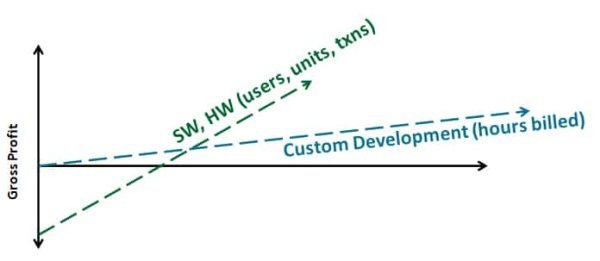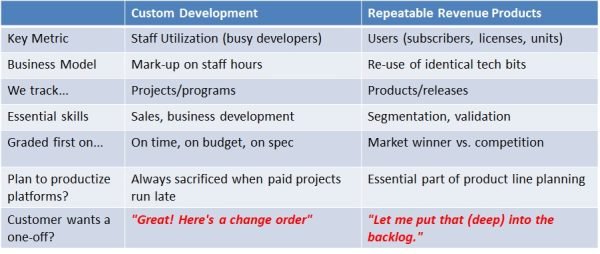
Software Economics and Slippery Slopes for Product Companies
We invited software product management guru Rich Mironov to talk about his 20 years’ experience with enterprise software companies.
In this witty and insightful 30 minute webinar, he makes a number of key observations – things that you will recognize if you work in B2B with software products.
You can listen to the webinar by clicking the button below and read more from Rich at his website www.mironov.com.
And, if you’d like to discuss what this means at your company, please get in touch.
Listen to the webinar recording
Conflicting Metrics and Management Models
Many software enterprise companies find themselves caught between being a product company and a services company. Product companies make money by selling the same things thousands of times. Software services companies make money by doing custom development and charging for time and effort. This is a fundamental conflict.
In a product business you’re paid for the value you give to your customers and you have to decide what that is. That’s the job of product management. Your development team is a fixed cost so it’s not about minimizing costs but maximizing revenue. You do that by making it easy to sell the product, for example reducing complications and variations that confuse customers, slow things down, and are costly to support. But you do have to take a risk upfront and invest in developing a product.
In a services business (where you do custom development) you’re paid for the effort you put in and you build what your customers ask for. You make money right from the start but can’t scale things in the same way as a product business and you typically don’t own the Intellectual Property in what you’ve developed.
These are two very different business management models that drive competing behavior within an organization. Many enterprise software companies want to be product companies because they’re valued much more highly (as a business) but fall into the trap of becoming a services company.
Powerful customers and sales teams lead to slippery slopes
In a consumer business, you may have a million customers but none is individually powerful enough to make a difference to the business. In the Enterprise world deals are lumpy and big, and the sales pipeline is very visible to senior management. One lost deal can have big repercussions.
What you find is that every enterprise customer wants something extra because no product is ever a perfect fit. So the roadmap is seen as a starting point for a negotiation. Most requests sound reasonable and each sales team strongly advocates for their customer – because that’s what they’re good at and paid to do. However, all these requests taken together are the slippery slope that turns a product company into a services company.
Sales will say – let’s do everything on the roadmap and this one little thing to clinch this big deal. But we know that if we’re going to do one extra thing we have to not do something else – it’s about or not and.
Listen to the webinar to find out about Rich’s solution of giving the Head of Sales a ‘magic bullet’ to use once a quarter and having product managers keep a lightweight roadmap of what they’re working on right now.




Leave a comment